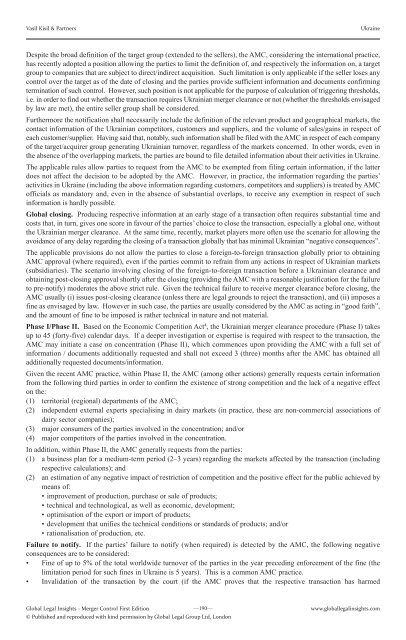Merger Controls First Edition - J Sagar Associates
Merger Controls First Edition - J Sagar Associates
Merger Controls First Edition - J Sagar Associates
Create successful ePaper yourself
Turn your PDF publications into a flip-book with our unique Google optimized e-Paper software.
Vasil Kisil & Partners Ukraine<br />
Despite the broad definition of the target group (extended to the sellers), the AMC, considering the international practice,<br />
has recently adopted a position allowing the parties to limit the definition of, and respectively the information on, a target<br />
group to companies that are subject to direct/indirect acquisition. Such limitation is only applicable if the seller loses any<br />
control over the target as of the date of closing and the parties provide sufficient information and documents confirming<br />
termination of such control. However, such position is not applicable for the purpose of calculation of triggering thresholds,<br />
i.e. in order to find out whether the transaction requires Ukrainian merger clearance or not (whether the thresholds envisaged<br />
by law are met), the entire seller group shall be considered.<br />
Furthermore the notification shall necessarily include the definition of the relevant product and geographical markets, the<br />
contact information of the Ukrainian competitors, customers and suppliers, and the volume of sales/gains in respect of<br />
each customer/supplier. Having said that, notably, such information shall be filed with the AMC in respect of each company<br />
of the target/acquirer group generating Ukrainian turnover, regardless of the markets concerned. In other words, even in<br />
the absence of the overlapping markets, the parties are bound to file detailed information about their activities in Ukraine.<br />
The applicable rules allow parties to request from the AMC to be exempted from filing certain information, if the latter<br />
does not affect the decision to be adopted by the AMC. However, in practice, the information regarding the parties’<br />
activities in Ukraine (including the above information regarding customers, competitors and suppliers) is treated by AMC<br />
officials as mandatory and, even in the absence of substantial overlaps, to receive any exemption in respect of such<br />
information is hardly possible.<br />
Global closing. Producing respective information at an early stage of a transaction often requires substantial time and<br />
costs that, in turn, gives one score in favour of the parties’ choice to close the transaction, especially a global one, without<br />
the Ukrainian merger clearance. At the same time, recently, market players more often use the scenario for allowing the<br />
avoidance of any delay regarding the closing of a transaction globally that has minimal Ukrainian “negative consequences”.<br />
The applicable provisions do not allow the parties to close a foreign-to-foreign transaction globally prior to obtaining<br />
AMC approval (where required), even if the parties commit to refrain from any actions in respect of Ukrainian markets<br />
(subsidiaries). The scenario involving closing of the foreign-to-foreign transaction before a Ukrainian clearance and<br />
obtaining post-closing approval shortly after the closing (providing the AMC with a reasonable justification for the failure<br />
to pre-notify) moderates the above strict rule. Given the technical failure to receive merger clearance before closing, the<br />
AMC usually (i) issues post-closing clearance (unless there are legal grounds to reject the transaction), and (ii) imposes a<br />
fine as envisaged by law. However in such case, the parties are usually considered by the AMC as acting in “good faith”,<br />
and the amount of fine to be imposed is rather technical in nature and not material.<br />
Phase I/Phase II. Based on the Economic Competition Act4 , the Ukrainian merger clearance procedure (Phase I) takes<br />
up to 45 (forty-five) calendar days. If a deeper investigation or expertise is required with respect to the transaction, the<br />
AMC may initiate a case on concentration (Phase II), which commences upon providing the AMC with a full set of<br />
information / documents additionally requested and shall not exceed 3 (three) months after the AMC has obtained all<br />
additionally requested documents/information.<br />
Given the recent AMC practice, within Phase II, the AMC (among other actions) generally requests certain information<br />
from the following third parties in order to confirm the existence of strong competition and the lack of a negative effect<br />
on the:<br />
(1) territorial (regional) departments of the AMC;<br />
(2) independent external experts specialising in dairy markets (in practice, these are non-commercial associations of<br />
dairy sector companies);<br />
(3) major consumers of the parties involved in the concentration; and/or<br />
(4) major competitors of the parties involved in the concentration.<br />
In addition, within Phase II, the AMC generally requests from the parties:<br />
(1) a business plan for a medium-term period (2–3 years) regarding the markets affected by the transaction (including<br />
respective calculations); and<br />
(2) an estimation of any negative impact of restriction of competition and the positive effect for the public achieved by<br />
means of:<br />
• improvement of production, purchase or sale of products;<br />
• technical and technological, as well as economic, development;<br />
• optimisation of the export or import of products;<br />
• development that unifies the technical conditions or standards of products; and/or<br />
• rationalisation of production, etc.<br />
Failure to notify. If the parties’ failure to notify (when required) is detected by the AMC, the following negative<br />
consequences are to be considered:<br />
• Fine of up to 5% of the total worldwide turnover of the parties in the year preceding enforcement of the fine (the<br />
limitation period for such fines in Ukraine is 5 years). This is a common AMC practice.<br />
• Invalidation of the transaction by the court (if the AMC proves that the respective transaction has harmed<br />
Global Legal Insights <strong>Merger</strong> Control <strong>First</strong> <strong>Edition</strong><br />
—190—<br />
© Published and reproduced with kind permission by Global Legal Group Ltd, London<br />
www.globallegalinsights.com


